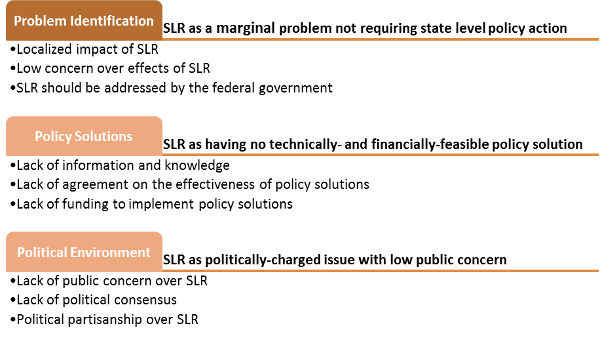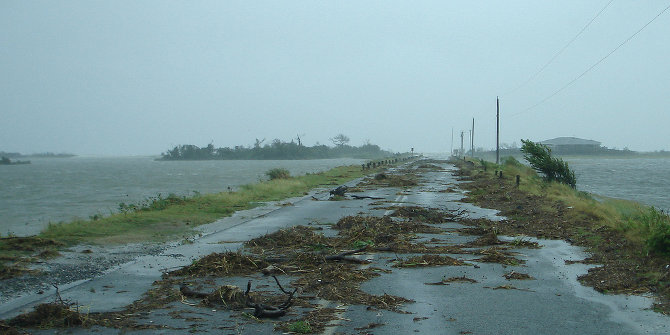Nearly half of the US population lives in coastal counties, meaning that climate change related sea-level rise should be a pressing concern for governments and policymakers – and yet for some it is not. Using the Virginia legislature as a case study, Juita-Elena (Wie) Yusuf, Katharine A. Neill, Burton St. John III, Ivan K. Ash and Kaitrin Mahar find that the issue of sea-level rise is politically controversial and is perceived by legislators to be a low priority policy concern, especially among those who do not represent coastal districts.. There is also significant disagreement over appropriate policy remedies to address local sea-level rise.
Sea-level rise (SLR) is a serious problem that directly impacts coastal communities and can have national and global consequences. Across many coastal areas worldwide and in the US, flooding due to SLR presents risks to personal and public property, economic activity, public infrastructure, and military operations. Additionally, with a globalized economy, indirect economic effects are likely to be significant even far from the coastline.
In many areas of the world threatened by SLR, governments are taking steps to mitigate the problem. However, in the United States, efforts are more limited, despite the fact that roughly 48 percent of the US population resides in coastal counties. In the coastal state of Virginia, the Hampton Roads region is experiencing the second fastest sea-level rise in the country, second only to New Orleans. Yet, little action has been taken by the Virginia state legislature to address SLR. This indicates a divergence between problem severity and legislative concern and raises the question of why state policymakers do not see SLR as an issue requiring legislative action.
To answer this question, in the summer of 2012 we conducted a web and mail survey that was sent to 140 Virginia legislators. A total of 36 legislators completed the survey (10 each from non-coastal Republicans and Democrats and 8 each from coastal Republicans and Democrats). We asked respondents several questions regarding their perceptions of the threat posed by SLR to the state, the need for state-level action, and the barriers to that action. We found that the issue of SLR in Virginia is characterized by high conflict and political controversy, and is perceived as a low priority policy concern. These characteristics have contributed to SLR policy inertia.
We found that 71.5 percent of legislators generally agreed that the increased risk of flooding due to SLR is likely to adversely affect the state’s economic well-being, but only 29 percent strongly agreed that this is the case. This suggests that while there is general concern for SLR, it is not viewed as a pressing issue. Similarly, when asked about the likelihood of specific risks or consequences of flooding due to SLR, such as loss of private and public property and disruption to economic activities, most were rated, on average, in the middle ground between likely and not likely. This suggests that legislators generally do not consider most sea-level rise (SLR) risks as very likely to occur over the next several decades.
The localized nature of SLR impacts is highlighted by the tendency of coastal district legislators to identify SLR as a more serious threat to their district compared to legislators from non-coastal areas. But while many of SLR’s most visible impacts are localized, it is also viewed as a global problem. This presents a challenge in determining who is responsible for leading action on SLR. In Virginia we found that one factor keeping SLR a low-priority problem is the general perception among state legislators that the federal government should take the lead in developing mitigation policies.
Adding to these obstacles to action is the politicized nature of the science of climate change. Republicans and conservatives in the US are generally skeptical of climate change and tend to be against most climate change policies. Political partisanship over SLR and climate change more broadly has inhibited action on SLR in Virginia. As Figure 1 shows, lack of political consensus on both the importance of SLR and the need to take action regarding SLR were the top obstacles cited by Virginia legislators who responded to the survey (77 percent and 85 percent, respectively).
Figure 1 – Perceived challenges to adopting policies to address sea-level rise

Another critical challenge is a lack of agreement among legislators as to the appropriate policy remedy, particularly in terms of potential effectiveness. The Virginia Governor’s Climate Change Taskforce identified several policy solutions for addressing SLR, but when state legislators were asked about these policy solutions, there was no strong consensus about which options would be most effective. Most potential solutions—such as developing a state adaptation strategy and providing funds to municipal governments to address SLR adaptation needs—were viewed as very effective by less than 25 percent of surveyed legislators. Adding to this lack of consensus are the perceived constraints to action. When asked to identify factors that make it difficult to adopt policies to address SLR, Virginia legislators noted the lack of funding as a key constraint (77 percent), in addition to lack of scientific information about SLR (44 percent) and lack of knowledge about policy solutions (44 percent) (See Figure 1.).
Our findings suggest at least a two-fold challenge: 1) difficulties with SLR being identified as a problem and 2) lack of consensus that some policy solutions have the potential to be effective at addressing SLR. The above analysis points to how SLR policy inertia is a result of fractious and politically-charged viewpoints on the matter, mixed with perceived gaps in solutions and conflicting perspectives on the role of the state concerning SLR. Figure 2 summarizes the challenges to legislative action on SLR.
Figure 2 -Barriers to Legislative Action on Sea-Level Rise

These points of friction may come in to fuller view as extreme events (e.g. major floods or large storms) raise awareness of the very real threats from SLR. Federal pressure and incentives, such as mandates or funds to address SLR issues, may be ways to gain state attention and elevate possible policy solutions. Federal leadership, through the crafting of a national framework for addressing SLR, may also be important for raising SLR onto the state policy agenda.
SLR remains a controversial topic in the US because of its connection to climate change. However, given the nation’s current political climate, removing the ideological debate from the practical issue of how to address climate change is a daunting task. What can likely precipitate a tipping point is continual focus on the risks and impacts of SLR and avoiding debates about its causes. This strategy may be limited in its effectiveness, however, because it allows only for a narrow treatment of the issue.
That our findings are, for the most part, consistent with those of other studies of sub-national climate change policies across a variety of geographic settings suggests that state-level SLR policy in the US may not be significantly different or unique. Experiences in other countries may offer additional insights into creating tipping points that can allow governments to address SLR effectively. At a minimum, this study finds that, to be able to reach that tipping point, a confluence of actors, options, and events are needed to establish a saliency for SLR that rises above politically-charged viewpoints.
Update: Our research was conducted in 2012 when Virginia was under a Republican Governor, Republican-controlled House of Delegates and Democrat-controlled Senate. Currently, the state is under a Republican-controlled House and Senate, with a Democrat Governor. Since our article was originally written, coastal Virginia has not faced any major natural disasters post-Hurricane Sandy (October 2012), although it has seen recent flooding and inundation due to King Tide and exacerbated nuisance flooding due to continued subsidence and accelerated sea-level rise. The latter, however, does not appear to have been sufficient to increase SLR issue saliency. The 2015 legislative session saw three SLR-related legislative proposals rise onto the agenda: House Bill 1731 which would require the Secretary of Natural Resources to report annually on certain environmental issues including SLR; and House Bill 2205 and Senate Bill 1428 to require participation in the Regional Greenhouse Gas Initiative and establish a revolving fund to provide resources for implementing SLR adaptation efforts. These bills were not enacted.
This article is based on the paper “The sea is rising… but not onto the policy agenda: A multiple streams approach to understanding sea level rise policies” in Environment and Planning C: Government and Policy.
Featured image credit: U.S. Fish and Wildlife Service Northeast Region (Flickr, CC-BY-2.0)
Please read our comments policy before commenting.
Note: This article gives the views of the author, and not the position of USAPP – American Politics and Policy, nor the London School of Economics.
Shortened URL for this post: http://bit.ly/1TnEkYH
_________________________________
 Wie Yusuf – Old Dominion University
Wie Yusuf – Old Dominion University
Wie Yusuf is Associate Professor in the School of Public Service, Old Dominion University. Her research on SLR, climate change, adaptation and resilience are part of ODU’s Climate Change and Sea Level Rise Initiative and support the Hampton Roads Sea Level Rise Preparedness and Resilience Intergovernmental Planning Pilot Project.
 Katharine A. Neill – Rice University
Katharine A. Neill – Rice University
Katharine A. Neill is the Alfred C. Glassell III postdoctoral fellow in drug policy at the Baker Institute of Public Policy at Rice University. Her current research focuses on marijuana reform efforts in the state of Texas. She has published in several peer-reviewed journals in various policy areas, including crime, energy and environmental policy.
 Burton St. John III – Old Dominion University
Burton St. John III – Old Dominion University
Burton St. John III is Associate Professor in the Department of Communication and Theatre Arts, Old Dominion University.
 Ivan K. Ash – Old Dominion University
Ivan K. Ash – Old Dominion University
Ivan K. Ash is Associate Professor in the Department of Psychology, Old Dominion University.
 Kaitrin Mahar – Old Dominion University
Kaitrin Mahar – Old Dominion University
Kaitrin Mahar is doctoral candidate in the Ph.D. in public administration and urban policy program at Old Dominion University.



